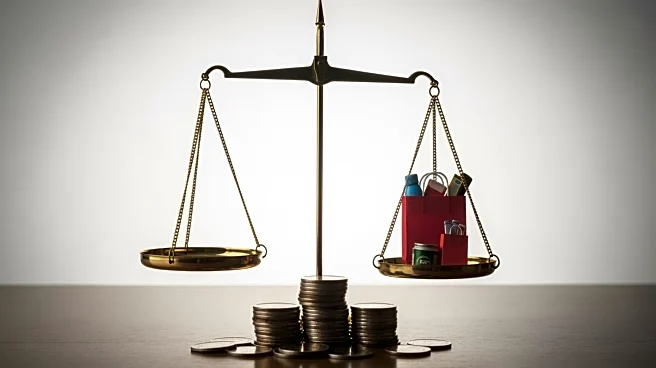What's Happening?
The US economy is showing signs of vulnerability as middle-class households reduce spending amid persistent inflation and economic uncertainty. Despite a slower increase in living costs compared to 2022,
consumer prices have risen by 27% since the pandemic began. This has led to a significant divide between higher-income households, who continue to drive economic growth, and lower-income families, who are pulling back due to tight budgets and corporate layoffs. The richest 10% of households are responsible for nearly half of total US spending, buoyed by stock market gains. However, the economic strain is now affecting middle-class families, creating concerns about a potential downturn. Federal Reserve Chair Jerome Powell has noted the bifurcation in the economy, and economists warn that the economy is highly vulnerable if high-income households face setbacks.
Why It's Important?
The reduction in spending by middle-class households could have significant implications for the US economy. As the wealthiest households continue to support economic growth, any disruption in their financial stability, such as a stock market downturn, could lead to a recession. The reliance on a small segment of the population to sustain economic activity highlights the fragility of the current economic structure. This situation underscores the need for policies that address income inequality and support broader economic participation. The potential for increased economic vulnerability could impact public policy decisions and influence future economic strategies.
What's Next?
Economists and policymakers are closely monitoring the situation, with potential actions including adjustments to interest rates and fiscal policies to support economic stability. The Federal Reserve may consider further interventions to address the bifurcation in the economy. Businesses and consumers are likely to remain cautious, with spending patterns influenced by ongoing economic uncertainty. The situation may prompt discussions on income redistribution and measures to strengthen the middle class's economic position.
Beyond the Headlines
The current economic dynamics may lead to long-term shifts in consumer behavior and spending patterns. The focus on high-income households as economic drivers could exacerbate social and economic inequalities, prompting debates on ethical and policy responses. The situation may also influence cultural attitudes towards wealth and consumption, potentially leading to changes in societal values and priorities.








